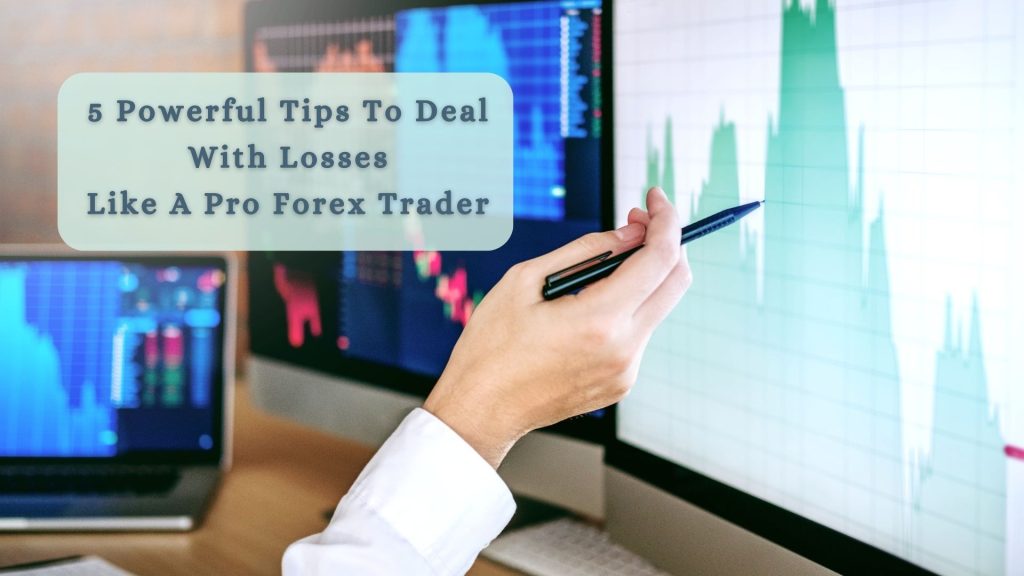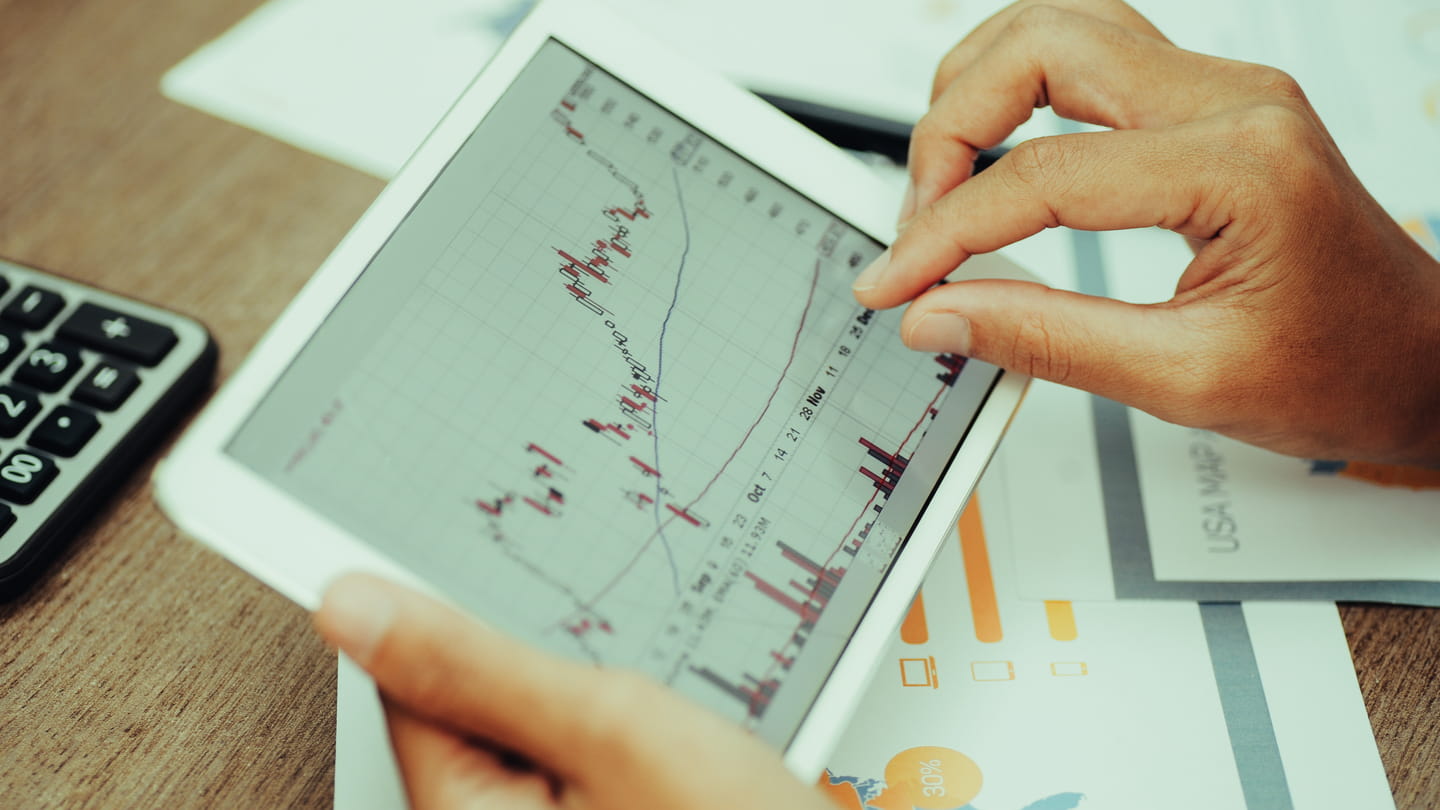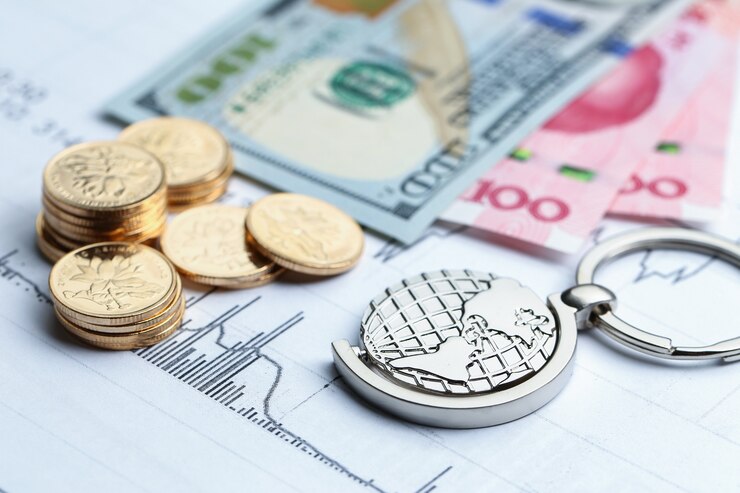5 Powerful Tips To Deal With Losses Like A Pro Forex Trader
One thing that every forex beginner is afraid of while starting off their trading journey is dealing with losses. The ultimate goal for which we take this path and decide to take the risk is making Read More
Still, knowing the relevance of risking for a better future does not reduce the fear that we feel while placing the very first trade. Whether you are about to get into forex trading or already trying to deal with the occasional setbacks and losses that are draining you as a trader, this blog will be an insightful read to rewind your mind and restart when you feel ready. So, keep reading till the end and learn the 5 powerful tips to follow for dealing with losses like a pro trader. The first thing that you need to learn while getting into trading is that profits are not guaranteed and it does take some time to reach a level where you are consistently profitable. Devising a sound strategy does not happen overnight and making it work in the volatile currency market requires a good amount of knowledge and skills which again takes some time to obtain for a newbie. In short, you are going to lose some money in the process of making more money. But losing a lot of money is what makes us lose our minds as we forget to focus on risk management and do not set a limit on the amount we can afford to lose. Just setting a limit is not enough as we will have to manage the risk in a way that we don’t lose anything over and above the set limit. Now, if you don’t close a losing trade early, you will end up losing a lot more than what you are comfortable with. As long as the losses are manageable, you don’t have to worry about them. Forex traders always talk about their wins and losses in the number of pips earned or lost in a trade and hence pip calculations are important for limiting the losses. You can rely on an automated pip calculator to determine the accurate value of pips in the currency of your choice and plan your trade entry and exits based on the number of pips you want to catch in a trade. One key difference that you can see between novice traders and experienced traders is that the seasoned pros are not bothered about the possibility of a loss as they are already prepared for it. They have seen all kinds of market situations and trade scenarios and thus they don’t panic when something goes wrong during the trading process. They are ready to take action while newbies are easily overwhelmed and intimidated when the market becomes unpredictable. A professional trader will have realistic expectations and their trading approach is more rational. As a beginner, you need to play it safe as you are still learning and placing a stop loss serves as a safety net in case you fall. A stop loss is an automated exit that takes you out of a losing trade before the loss takes a huge toll on your account balance. The stop loss does not prevent a loss but it does minimise the impact of the loss. The stop loss should not be too close to the entry price as it does not give enough room for the trade to run and even a minor pullback can lead to the stop loss being triggered which takes away the trading opportunity. So, you need to decide how much amount you can afford to lose in a trade and place the stop loss based on that. If you want to remain flexible with the stop orders, you can try trailing stop loss which moves on its own based on the market situation. The reason why many traders end up losing a significant portion of their capital is revenge trading. When we encounter a number of losses in a row, we just want to recover it by winning a few trades and getting into revenge trading. However, the possibility of recovering the lost money from revenge trading is thin as you are just making impulsive decisions while being emotional and the chances of winning a trade without applying any logic is very narrow. The cause of revenge trading is often the inability to control our emotions and this costs us a lot in live trading. Revenge trading often leads to overtrading which again increases the losses. Now, how can you quit this habit? The answer is simple but hard to implement. You will have to gain emotional control and follow a disciplined approach towards trading. You should accept the losses gracefully instead of chasing profits. One thing you can do to build trading discipline is practise on a demo account. The demo account is a risk-free place for learning but you get to trade in real-time market conditions and see how your strategy will work in the live market while using virtual funds. Besides trading in a demo account, you should also consider using different trading calculators to place your trades smartly. For example, you can use a profit calculator to calculate estimated profits in a trade. You can do this by adding the lot size, number of lots, and opening & closing price. It’s a good way to trade in a disciplined way because you can exit the trade when the desired amount is earned. Being consistent and disciplined as a trader is not about trading continuously without any break. You need to indulge in continuous learning and keep pushing through the difficulties but this does not mean that you cannot take a time out when you need to. When you are dealing with losses, it is normal to feel stressed and often this stress can result in burnout for a full-time trader or even a beginner. Hence, you should learn to take breaks when the market is not moving in your favour and come back after reflecting on your decisions as it helps to see where you went wrong. Sometimes, it is just the timing and sometimes you need to work on your strategy when the market is shifting. Basically, taking an off gives you enough time to figure things out and do better when you come back. The forex market will be there for a fairly long time and you won’t be missing out on any opportunity while staying out for a short while. Trading can be a tiring task at times and you really need to get back your energy by doing something that is not related to trading. This can be hard for someone who is a workaholic but trust me, such breaks are much needed for a trader and such breaks are a must after encountering losses in a row. The last tip to deal with the losses like a pro trader is minimising the losses by placing smaller-sized trades. Minimising the trade size surely reduces the pressure that you feel while making trading decisions. If you are not yet ready to trade with standard lots, trade with mini or micro lots. You will still be trading in the live market but the risk will be lower and that way, you can learn to handle the losses without losing much in the first place. Optimal position sizing is the first rule of risk management and when you are good at managing the risk, you will be able to deal with the losses like a professional. When you are a beginner, start with a smaller amount of capital and trade with micro lots to limit the risk per trade. You can gradually increase the trade size and even use leverage after you feel more confident in your skills and strategy. But until then, you should follow a cautious approach and avoid taking excess risk. Because the initial phase of a trader is to make mistakes and learn from them. When you are able to control the risk, you will not be stressed about the amount you lose while making these mistakes. Instead, you will be able to focus on the lessons you learn as a new trader. Wrapping up So, these are the 5 powerful tips that can help you to deal with the losses like how a professional trader does. In the end, losses do not define your success as a trader, because even the most profitable and experienced trader encounters losses now and then. You should never stop trying as you are not losing as long as you are learning something from the process.
7 Best Islamic Forex Brokers of 2024
As per the previous year’s reports from ‘The Modern Trader’ and BIS, there were around 13.9 million traders taking part in the volatile forex market. Based on recent research done by Professor Robert, this figure is expected to cross 14.5 million in the year 2024. This includes traders from all parts of the world, and will obviously be made up of people with different cultural and religious beliefs. Each religion has established a set of values, ethics and morals that have to be followed by respecting the rules taught by the religion or faith. Speaking about Islamic traders, they are bound by the rules of Islamic finance which may make trading on a regular account quite difficult for them. Many forex brokers are well aware of this fact and have come up with the idea of Islamic accounts, which will allow these traders to participate in forex trading without breaking the rules established by their religion. Read More
By the end of this article, you will get to know more about the usage of Islamic accounts and will also get a list of the 7 best Islamic forex brokers of 2024 that you can consider for opening an Islamic trading account. Islamic accounts are swap-free trading accounts which cater to the needs of Muslim traders. Swap in forex can be defined as the interest earned or paid while keeping a trade position open for more than a day, or in other words, it is the rollover charges applied on overnight trade positions. The element of interest is not acceptable for Muslims based on the rules of Islamic finance and Sharia law. They strictly prohibit believers from engaging in any financial activity that involves receiving or giving interest on a principal amount. This even applies to bank deposits and financial loans. Forex swap is also a form of interest that is applied when we buy and sell currencies for trading. Swap doesn’t come into play when we follow short-term trading strategies like scalping or day trading. But every time a trade position is on hold or open overnight, that will result in a long swap or short swap based on the type of position. If you are wondering what is long swap or a short swap, then here’s the answer: So, like we said before, the act of paying or earning interest is Haram for Muslims based on the Sharia law. Based on this Muslim traders have 2 options to avoid swap. Since we have already discussed the purpose of trading on an Islamic account, now we can move forward with the list of halal forex brokers you can choose for trading on the best Islamic trading accounts. As you can see, each broker does have a different approach when it comes to Islamic trading accounts. The trading conditions, charges and working of the Islamic account will be different with each broker even if they all are introduced with the very same purpose. Hence you need to take your time and make a wise decision when it comes to choosing the best Islamic forex broker. Make sure you are getting the best trading conditions on your Islamic account as well as flexibility in terms of the trading styles and strategies that you can follow. We hope that you can choose the best one for you based on the above-given information because choosing an ideal broker is very important for getting the best trading experience on Islamic accounts. Let us know which Islamic Forex broker would you like to open an account with!Forex Trading on Islamic Accounts
Best Islamic Forex Brokers to Open an Islamic Trading Account
Mastering Margin Calculations in Forex: Your Comprehensive Guide
Margin is a fundamental concept in Forex trading that every trader must understand. It plays a crucial role in determining position size, managing risk, and ensuring the safety of your account. Let’s understand the concept in this blog.
-
Understanding Margin:
- Margin Defined: Margin is a security deposit required by your broker to open and maintain a trading position. It ensures that you have sufficient funds to cover potential losses.
- Leverage Effect: Margin enables traders to control larger positions with a relatively small amount of capital, thanks to leverage. However, this also increases the potential for both gains and losses. Checkout more at calculate margin forex.
-
Margin Calculation Formula:
- Margin = (Lot Size * Contract Size * Price) / Leverage
- In this formula, the key components are:
- Lot Size: The volume or quantity of the position you want to trade.
- Contract Size: The amount of the base currency in a single contract.
- Price: The current market price of the currency pair you’re trading.
- Leverage: The leverage ratio provided by your broker.
-
Example Margin Calculation:
- Let’s say you want to trade one standard lot (100,000 units) of EUR/USD, where the contract size is €100,000, the current price is 1.2000, and your leverage is 50:1.
- Margin = (1 * €100,000 * 1.2000) / 50 = €2,400
- This means you need €2,400 in your trading account to open this position.
-
Using the Margin Calculator:
- Most Forex trading platforms offer a margin calculator that simplifies this process. You input your account currency, the currency pair you’re trading, the trade size, and the leverage, and it calculates the required margin for you.
-
Risk Management and Margin:
- Margin serves as a risk management tool. It helps you determine the maximum size of a position you can take based on your account balance and risk tolerance.
- Traders often set stop-loss orders to limit potential losses, which also affects margin requirements.
-
Margin Calls and Liquidation:
- If your account balance falls below the required margin due to trading losses, you may receive a margin call from your broker.
- Failure to meet the margin call by depositing additional funds may lead to the liquidation of your positions to cover losses.
-
Leverage and Margin Trading:
- While leverage can amplify profits, it also magnifies potential losses. Traders should use leverage cautiously and consider the risks involved.
- Higher leverage ratios require smaller margin deposits, but they also increase the risk of significant losses.
-
Margin Level:
- Margin level is the ratio of your account equity to your used margin, expressed as a percentage.
- A low margin level indicates a higher risk of receiving a margin call.
-
Margin Requirements by Brokers:
- Different brokers may have varying margin requirements, even for the same currency pairs.
- Margin requirements may change based on market conditions, news events, or broker policies.
-
Calculating Margin for Different Lot Sizes:
– The margin calculation formula can be applied to various lot sizes, such as micro lots, mini lots, and standard lots, by adjusting the lot size in the formula.
In conclusion, mastering margin calculations in Forex is essential for effective risk management and position sizing. Using the margin calculator provided by your broker simplifies this process, but understanding the underlying formula and its components is crucial. Always consider the impact of leverage and margin on your trading strategy, and use these tools wisely to protect your capital and maximize your trading potential.
How to Open an Islamic Forex Account: A Comprehensive Guide
Opening an Islamic Forex account, also known as a swap-free account, is an important step for Muslim traders who wish to participate in the Forex market while adhering to Islamic finance principles. In this comprehensive guide, we will explore the process of opening an Islamic Forex account, including its features, benefits, and key considerations.
Understanding the Islamic Forex Account (Swap-Free Account):
Before diving into the account opening process, let’s clarify what an Islamic Forex account entails:
Islamic Finance Principles: Islamic finance principles prohibit the payment or receipt of interest (Riba) and the involvement in unethical or prohibited activities. In conventional Forex trading, overnight interest payments (swap or rollover) are common, which conflicts with Islamic finance principles. Read More
Swap-Free Solution: To accommodate Muslim traders, many Forex brokers offer Islamic Forex accounts, also referred to as swap-free accounts. These accounts eliminate interest-based swaps, making them compliant with Islamic finance. Features and Benefits of Islamic Forex Accounts: Steps to Open an Islamic Forex Account: Now, let’s explore the step-by-step process of opening an Islamic Forex account: Key Considerations: In conclusion, opening an Islamic Forex account provides an opportunity for Muslim traders to participate in the Forex market while upholding their religious beliefs. It offers a swap-free solution that aligns with Islamic finance principles and provides equal access to trading opportunities. By following the steps outlined in this guide, traders can open and operate their Islamic Forex accounts with confidence and integrity.
Tips for Using a Forex Profit Calculator
A Forex profit calculator is an invaluable tool for traders, enabling them to assess potential profits and losses quickly. Here are essential tips for using a Forex profit calculator effectively, incorporating the keyword “forex calculator profit” multiple times:
- Calculate Position Size:
A Forex profit calculator helps you determine the optimal position size based on your risk tolerance and the percentage of your capital you’re willing to risk in a trade. Use the “forex calculator profit” to calculate the position size that aligns with your risk management strategy.Read More
Before entering a trade, assess the risk-reward ratio to ensure it’s favorable. A good rule of thumb is to aim for a minimum of 1:2, meaning your potential reward should be at least twice your risk. The “forex calculator profit” can help you analyze different risk-reward scenarios. Determine your stop-loss and take-profit levels based on technical or fundamental analysis.Utilize the “forex calculator profit” to calculate the potential profit or loss at these levels, helping you make informed decisions. If you have multiple open trades, use the calculator to monitor the combined profit or loss of all positions. The “forex calculator profit” aids in keeping track of your overall portfolio performance. Leverage can amplify both profits and losses. Before using leverage, input different leverage ratios into the “forex calculator profit” to understand how they affect your potential gains or losses. Ensure you consider leverage carefully and use it prudently. Use the “forex calculator profit” to run various trade scenarios. This can include adjusting entry and exit points or altering position sizes. Experimenting with different scenarios helps you make more informed trading decisions. When trading on margin, calculate the required margin for your position using the “forex calculator profit.”This ensures you have sufficient margin to maintain your trade and avoid margin calls. Some calculators include features to factor in overnight swaps and commissions. These costs can impact your overall profit, so it’s essential to account for them. Utilize the “forex calculator profit” to calculate the net profit after accounting for these expenses. Continuously improve your trading skills by using the calculator for analysis and learning. Stay updated with changes in the Forex market, and adapt your trading strategies accordingly. Double-check your inputs to ensure accuracy when using the “forex calculator profit.” A small mistake in the data can lead to incorrect calculations. Accuracy is crucial for making sound trading decisions. In conclusion, a Forex profit calculator is a versatile tool that can significantly enhance your trading strategy. By incorporating these tips and using the “forex calculator profit” effectively, you can make more informed decisions, manage risk, and optimize your trading performance in the dynamic Forex market.
Tips for Using a Forex Profit Calculator
A Forex profit calculator is an invaluable tool for traders, enabling them to assess potential profits and losses quickly. Here are essential tips for using a Forex profit calculator effectively, incorporating the keyword “forex calculator profit” multiple times:
- Calculate Position Size:
A Forex profit calculator helps you determine the optimal position size based on your risk tolerance and the percentage of your capital you’re willing to risk in a trade. Use the “forex calculator profit” to calculate the position size that aligns with your risk management strategy.Read More
Before entering a trade, assess the risk-reward ratio to ensure it’s favorable. A good rule of thumb is to aim for a minimum of 1:2, meaning your potential reward should be at least twice your risk. The “forex calculator profit” can help you analyze different risk-reward scenarios. Determine your stop-loss and take-profit levels based on technical or fundamental analysis.Utilize the “forex calculator profit” to calculate the potential profit or loss at these levels, helping you make informed decisions. If you have multiple open trades, use the calculator to monitor the combined profit or loss of all positions. The “forex calculator profit” aids in keeping track of your overall portfolio performance. Leverage can amplify both profits and losses. Before using leverage, input different leverage ratios into the “forex calculator profit” to understand how they affect your potential gains or losses. Ensure you consider leverage carefully and use it prudently. Use the “forex calculator profit” to run various trade scenarios. This can include adjusting entry and exit points or altering position sizes. Experimenting with different scenarios helps you make more informed trading decisions. When trading on margin, calculate the required margin for your position using the “forex calculator profit.”This ensures you have sufficient margin to maintain your trade and avoid margin calls. Some calculators include features to factor in overnight swaps and commissions. These costs can impact your overall profit, so it’s essential to account for them. Utilize the “forex calculator profit” to calculate the net profit after accounting for these expenses. Continuously improve your trading skills by using the calculator for analysis and learning. Stay updated with changes in the Forex market, and adapt your trading strategies accordingly. Double-check your inputs to ensure accuracy when using the “forex calculator profit.” A small mistake in the data can lead to incorrect calculations. Accuracy is crucial for making sound trading decisions. In conclusion, a Forex profit calculator is a versatile tool that can significantly enhance your trading strategy. By incorporating these tips and using the “forex calculator profit” effectively, you can make more informed decisions, manage risk, and optimize your trading performance in the dynamic Forex market.
Exploring Alternative Investment Vehicles: Hedge Funds, Private Equity, and Venture Capital
Traditional investment avenues such as stocks and bonds have long been the cornerstone of investment portfolios. However, in today’s ever-evolving financial landscape, Read More
Hedge Funds: Hedge funds are pooled investment funds that employ various strategies to generate returns for their investors. Unlike traditional mutual funds, hedge funds often have more flexibility in their investment strategies, including the ability to use leverage, short-selling, and derivatives. Hedge funds aim to generate positive returns regardless of market conditions, often by employing strategies such as long-short equity, event-driven investing, and global macro trading. While hedge funds offer the potential for higher returns, they also come with higher fees and greater risks, including liquidity risk and manager risk. Private Equity: Private equity involves investing in privately held companies or taking significant ownership stakes in public companies that are not traded on public stock exchanges. Private equity firms typically acquire companies with the goal of improving their performance, increasing their value, and eventually selling them for a profit. Private equity investments offer the potential for substantial returns, but they also entail significant risks, including illiquidity, operational risks, and regulatory risks. Private equity investments are typically long-term in nature, requiring patience and a high tolerance for risk. Venture Capital: Venture capital involves investing in early-stage or growth-stage companies with high growth potential. Venture capital firms provide capital and strategic support to startups in exchange for equity ownership. Venture capital investments are characterized by high risk and high potential reward, with the majority of startups failing to achieve significant returns. However, successful investments in high-growth startups can yield substantial profits for venture capital investors. Venture capital investments offer the opportunity to participate in innovation and disruptive technologies but also come with significant risks, including business failure, market volatility, and regulatory uncertainty. Incorporating Alternative Investments into Diversified Portfolios: Risk Management: Alternative investments can help diversify portfolios and reduce overall portfolio risk by providing exposure to asset classes with low correlation to traditional stocks and bonds. However, it’s essential to carefully assess the risk-return profiles of alternative investments and consider their potential impact on portfolio volatility and liquidity. Due Diligence: Conduct thorough due diligence before investing in alternative investment vehicles, including assessing the track record and reputation of investment managers, evaluating investment strategies and performance metrics, and understanding the fee structure and liquidity terms. Portfolio Allocation: Allocate a portion of your investment portfolio to alternative investments based on your investment objectives, risk tolerance, and time horizon. Consider factors such as liquidity needs, diversification benefits, and long-term investment goals when determining the appropriate allocation to alternative investments. Conclusion Alternative investment vehicles such as hedge funds, private equity, and venture capital offer investors unique opportunities to diversify their portfolios and potentially enhance returns. However, these investments also come with inherent risks and complexities that require careful consideration and due diligence. By understanding the characteristics, risk-return profiles, and strategies for incorporating alternative investments into diversified portfolios, investors can effectively navigate the evolving landscape of alternative investments and build robust investment portfolios tailored to their financial goals and objectives.
Adapting to Changing Consumer Behavior: Strategies for Customer-Centric Business Models
In today’s dynamic marketplace, businesses must stay agile and responsive to evolving consumer preferences and behaviors. As technology advances and societal trends shift, Read More
Understanding Changing Consumer Behavior: Market Research and Data Analysis: Businesses must invest in market research and data analytics to gain insights into changing consumer preferences, purchasing patterns, and behavior. By analyzing customer data, businesses can identify trends, anticipate shifts in demand, and tailor their offerings to meet evolving customer needs. Consumer Segmentation: Segmenting consumers based on demographics, psychographics, and behavioral characteristics allows businesses to target specific customer groups with personalized marketing messages and product offerings. By understanding the unique preferences and motivations of different consumer segments, businesses can tailor their strategies to resonate with each audience effectively. Strategies for Adapting to Changing Consumer Behavior: Personalized Marketing Approaches: Personalization is key to engaging modern consumers and driving conversion. Businesses can leverage data-driven insights to deliver personalized marketing messages, product recommendations, and promotional offers tailored to individual customer preferences and past behavior. Personalized marketing approaches, such as email marketing, targeted advertising, and customized product recommendations, help businesses establish meaningful connections with customers and drive sales. Omnichannel Strategies: With the rise of digital technology, consumers expect seamless and integrated experiences across multiple channels and touchpoints. Businesses can adopt omnichannel strategies that unify online and offline channels, allowing customers to interact with the brand consistently across various platforms, including websites, social media, mobile apps, and physical stores. Omnichannel strategies enable businesses to provide a seamless customer experience, optimize convenience, and drive customer loyalty and retention. Enhancing Customer Experiences: Exceptional customer experiences are essential for building brand loyalty and advocacy. Businesses should focus on delivering superior customer service, personalized interactions, and frictionless transactions at every stage of the customer journey. Investing in customer relationship management (CRM) systems, employee training, and feedback mechanisms allows businesses to collect customer feedback, address pain points, and continuously improve the customer experience. Benefits of Customer-Centric Business Models: Increased Customer Satisfaction: By prioritizing customer needs and preferences, businesses can deliver products and services that meet or exceed customer expectations, leading to higher levels of satisfaction and loyalty. Improved Competitive Advantage: Businesses that adopt customer-centric business models gain a competitive advantage by differentiating themselves from competitors and building stronger relationships with customers. Higher Revenue and Profitability: Satisfied and loyal customers are more likely to make repeat purchases, recommend the brand to others, and contribute to long-term revenue growth and profitability. Conclusion Adapting to changing consumer behavior is critical for businesses to stay relevant and successful in today’s competitive marketplace. By understanding consumer preferences, leveraging data-driven insights, and implementing customer-centric strategies, businesses can anticipate shifts in demand, build stronger customer relationships, and drive sustainable growth in the digital age.
Global Investment Opportunities: Analyzing Emerging Markets and Frontier Economies
Emerging markets and frontier economies present compelling investment opportunities for investors seeking to diversify their portfolios and capitalize on the growth potential of rapidly developing economies. Read More
Understanding Emerging Markets and Frontier Economies: Emerging Markets: Emerging markets are countries that exhibit rapid economic growth and industrialization, typically characterized by expanding middle-class populations, increasing consumer spending, and infrastructure development. Examples of emerging markets include Brazil, China, India, and Russia. These markets offer attractive investment opportunities across various sectors, including technology, healthcare, consumer goods, and energy. Frontier Economies: Frontier economies refer to countries that are at an earlier stage of development than emerging markets, with smaller and less developed financial markets and infrastructure. While frontier economies may present higher risks compared to emerging markets, they also offer the potential for higher returns and greater diversification benefits. Examples of frontier economies include Vietnam, Nigeria, Bangladesh, and Pakistan. Investment Opportunities in Emerging Markets and Frontier Economies: Growth Prospects: Emerging markets and frontier economies offer robust growth prospects driven by factors such as demographic trends, urbanization, technological innovation, and increasing disposable incomes. These regions represent untapped markets with significant potential for expansion across various industries, including consumer goods, financial services, telecommunications, and infrastructure development. Geopolitical Considerations: When investing in emerging markets and frontier economies, it’s essential to consider geopolitical factors such as political stability, regulatory environment, and security risks. Geopolitical tensions, social unrest, and government policies can impact investment sentiment and market volatility, requiring investors to conduct thorough due diligence and risk assessments before investing. Risk Management Strategies for International Investment Portfolios: Diversification: Diversification is key to managing risks associated with investing in emerging markets and frontier economies. Spread investments across different regions, sectors, and asset classes to reduce concentration risk and mitigate the impact of adverse events in any single market or sector. Currency Risk Management: Currency fluctuations can significantly impact the returns of international investments. Consider hedging currency exposure using derivatives or investing in currency-hedged exchange-traded funds (ETFs) to mitigate the impact of exchange rate movements on investment returns. Due Diligence: Conduct thorough due diligence and research before investing in emerging markets and frontier economies. Evaluate macroeconomic indicators, political stability, regulatory environment, and corporate governance standards to assess the investment risk and identify attractive opportunities. Conclusion Emerging markets and frontier economies offer compelling investment opportunities for investors seeking to diversify their portfolios and capitalize on the growth potential of rapidly developing regions. However, investing in these markets requires careful consideration of geopolitical risks, currency fluctuations, and regulatory challenges. By understanding the dynamics of emerging markets and frontier economies and implementing robust risk management strategies, investors can effectively navigate the complexities of international investing and position themselves to capitalize on the long-term growth prospects of these dynamic regions.

 Delving Deeper: A Guide to Fundamental Analysis for Stock Traders
Delving Deeper: A Guide to Fundamental Analysis for Stock Traders  Algorithmic Alchemy: The Rise of Algorithmic Trading in Forex
Algorithmic Alchemy: The Rise of Algorithmic Trading in Forex  The Evolving Role of Insurance Intermediaries in the Digital Era: Challenges, Opportunities, and Strategies for Success
The Evolving Role of Insurance Intermediaries in the Digital Era: Challenges, Opportunities, and Strategies for Success  Navigating the Modern Business Landscape: Strategies for Success
Navigating the Modern Business Landscape: Strategies for Success  5 Powerful Tips To Deal With Losses Like A Pro Forex Trader
5 Powerful Tips To Deal With Losses Like A Pro Forex Trader 













